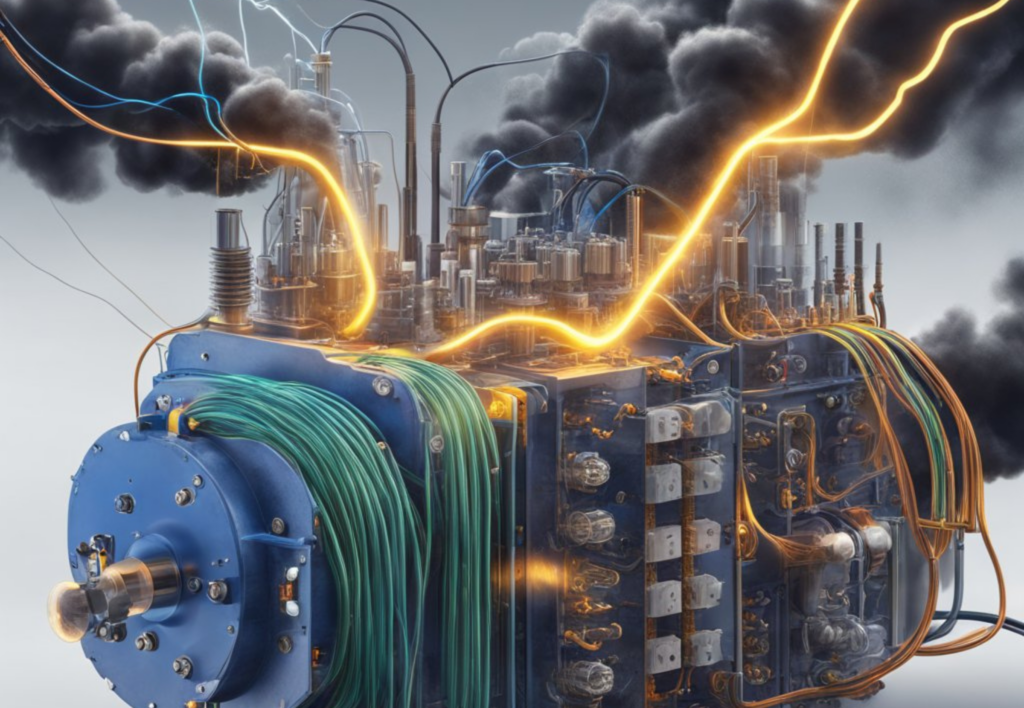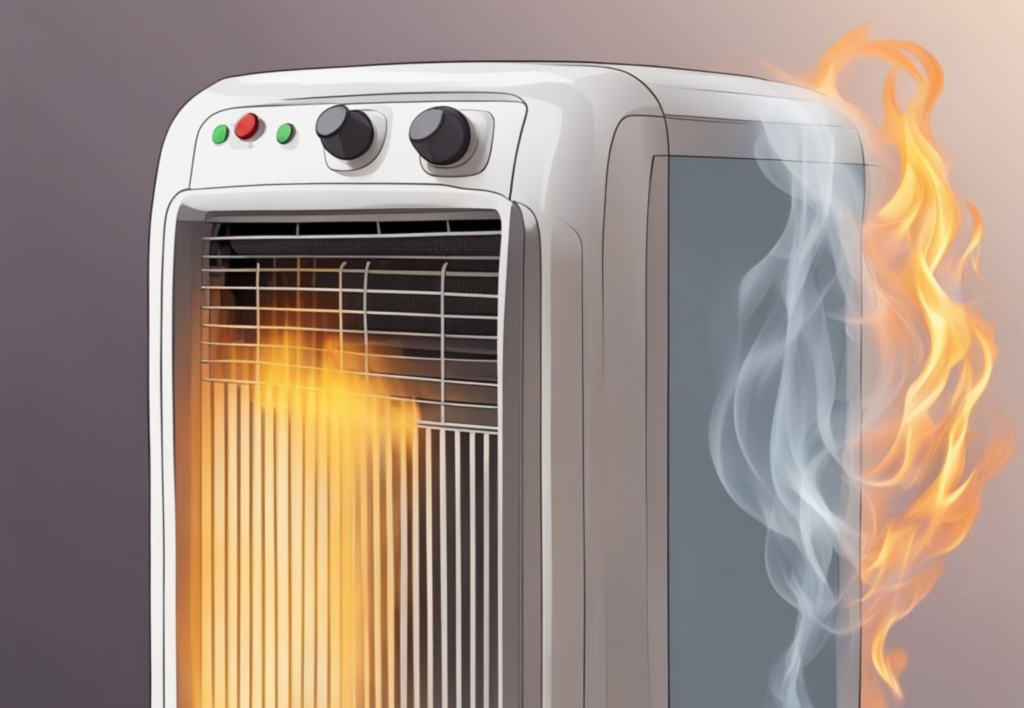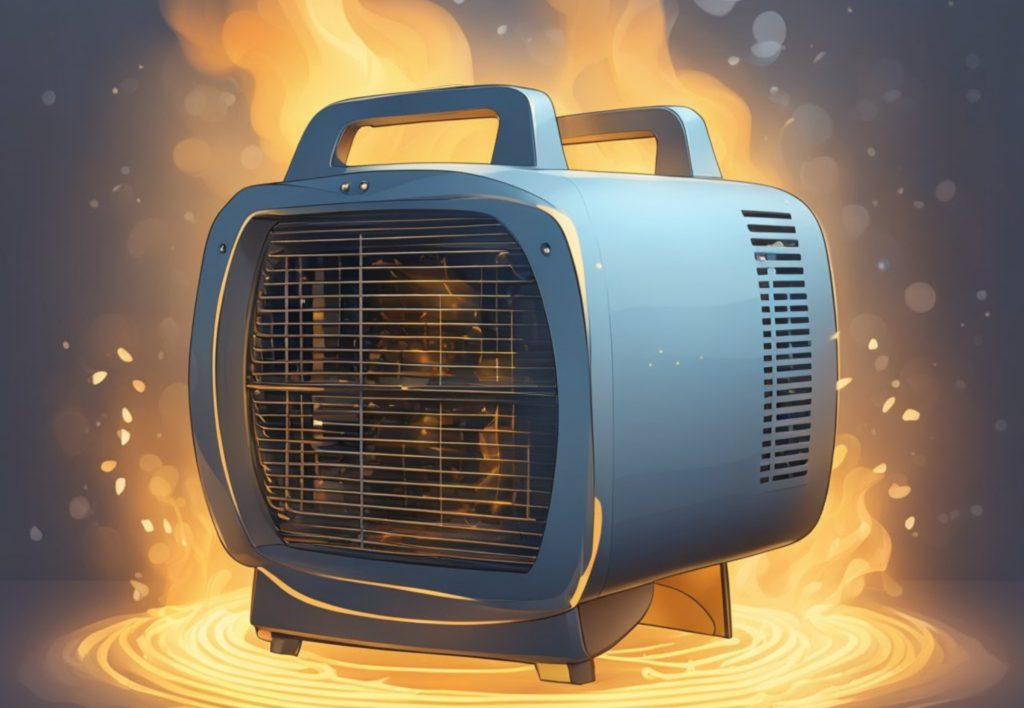Space Heater Keeps Tripping the Circuit Breaker? (10 Causes, Symptoms, & Fixes)
Space heaters are a cozy solution to combat cold temperatures in specific rooms or areas. But sometimes, users might wonder, “Why does my space heater keep tripping the breaker?” or encounter the issue where their space heater trips circuit breaker.
One common problem many users encounter is the space heater tripping the circuit breaker when in use. While this can be frustrating, it’s often a result of built-in safety features or other identifiable causes.
A space heater usually keeps tripping the breaker because of an overloaded circuit, faulty wiring, a mechanical malfunction, an old or damager breaker, the space heater is using too much voltage, there is a ground fault, there is an inconsistent voltage supply, the switch is faulty, or you have the wrong breaker installed.
Below, we delve into the 10 most common reasons why space heaters might keep tripping the breaker, offer guidance on what signs to look for and how to address each issue.
10 Common Reasons for Why Space Heaters Trip Circuit Breakers
Space heaters often trip circuit breakers due to a range of issues. An overloaded circuit, caused by too many devices running concurrently, is a primary culprit. Homes with faulty or outdated wiring can experience problems, especially if the heater’s wattage is higher than what the circuit can handle.
Short circuits, either within the heater or elsewhere on the line, can trigger a trip. Ground faults within the heater itself or issues with the breaker, whether due to age or improper rating, can also lead to problems.
Additionally, damaged heater components, voltage fluctuations in the main electrical grid, or issues with the heater plug or the outlet can all contribute to tripping circuit breakers.
Here are the most common issues, what to look for, and how to fix them!
1. Circuit Overload
A circuit overload occurs when more current is drawn from a particular circuit than it’s designed to handle. When space heaters, which typically require a lot of power, are used simultaneously with other appliances on the same circuit, it can exceed the circuit’s capacity.
What to Look For:
- Frequent tripping of the circuit breaker when the space heater is on.
- Other devices on the circuit are also switched on, drawing power simultaneously.
- Dimming or flickering lights when the heater is turned on.
How to Fix It:
- Unplug other devices from the same circuit when using the space heater.
- Use the heater on a dedicated circuit or one with fewer devices.
- Consider upgrading your home’s electrical system if overloads are a recurring issue.

2. Faulty Wiring
Faulty or old wiring can have reduced capacity to carry current safely. This can lead to overheating and consequently tripping the breaker, especially when high-wattage devices like space heaters are used.
What to Look For:
- Age of the home and its electrical system. Older homes are more susceptible.
- Warm outlets or a burning smell near the electrical fixtures.
- Frequent tripping even without many devices connected.
How to Fix It:
- Consult an electrician to inspect and possibly replace or repair faulty wiring.
- Avoid using high-wattage devices until the issue is resolved.
3. Space Heater Malfunction
If there’s an internal problem with the space heater, like short-circuiting or a malfunctioning component, it can draw excessive power, causing the breaker to trip.
What to Look For:
- The heater trips the breaker regardless of which outlet it’s plugged into.
- Unusual sounds or smells coming from the heater.
- Heater’s external body getting too hot too quickly.
How to Fix It:
- Consult the user manual for troubleshooting or reach out to the manufacturer.
- Consider getting the heater repaired or replaced.

4. Weak or Aging Circuit Breaker
Circuit breakers themselves can weaken over time. Sometimes the breaker itself is the problem. If your space heater makes power go out often, this could be the cause. An old or deteriorating breaker may trip more easily than it should, even if the circuit isn’t genuinely overloaded.
What to Look For:
- Age of the circuit breaker.
- The breaker trips frequently, even with low power consumption.
- Physical signs of wear or damage on the breaker.
How to Fix It:
- Have the breaker inspected and, if necessary, replaced by a qualified electrician.
- Ensure the new breaker matches the needs and specifications of your home’s electrical system.
5. Too High Heater Wattage for the Circuit
Space heaters come in various wattages. A heater with a wattage too high for the circuit it’s connected to can trip the breaker.
What to Look For:
- Specifications on the heater indicating its wattage.
- Comparison of the heater’s wattage with the circuit’s capacity.
How to Fix It:
- Use a space heater with a wattage appropriate for the circuit’s capacity.
- If you prefer a high-wattage heater, ensure it’s used on a circuit that can handle its demand.
6. Short Circuit in the Heater
A short circuit within the space heater means there’s an unintended path allowing electric current to flow where it shouldn’t.
A direct reason why a space heater blowing breaker can be an internal short circuit. This can cause a sudden surge in current, leading the breaker to trip for safety reasons.
What to Look For:
- Smoke or a burning smell coming from the heater.
- Charred or melted plugs and outlets.
- Sparks when the heater is plugged in or turned on.
How to Fix It:
- Immediately unplug the heater and stop using it.
- Consult the user manual or reach out to the manufacturer for guidance.
- Consider professional repair or replacement of the heater.

7. Ground Fault
A ground fault occurs when the current escapes the intended path and travels to the ground, often because of damaged insulation. When this happens, it can trip the breaker.
What to Look For:
- A tingling sensation when touching the heater, indicating a possible ground fault.
- The breaker trips as soon as the heater is plugged in or turned on.
- Damaged or frayed wires in the power cord.
How to Fix It:
- Unplug and cease using the heater immediately.
- Get the heater inspected by a technician.
- Replace damaged parts or the entire heater as needed.
8. Inconsistent Voltage Supply
If there’s inconsistency in the voltage supply, such as sudden spikes or drops, it can cause the breaker to trip when the space heater is operating, as it might draw more current to compensate for the fluctuation.
What to Look For:
- Other electrical appliances in the home malfunctioning or behaving erratically.
- Lights flickering unrelated to the operation of the space heater.
How to Fix It:
- Consult with your utility company to check for issues with the voltage supply.
- Consider using voltage stabilizers or surge protectors in your home.
9. Damaged or Faulty Heater Switch
The switch of the heater, responsible for turning it on or off, can become faulty over time. If damaged, it can cause electrical inconsistencies leading to breaker trips.
What to Look For:
- The heater doesn’t turn on or off smoothly.
- You need to jiggle or adjust the switch multiple times to operate the heater.
How to Fix It:
- Refrain from using the heater until the switch is fixed.
- Consult the manufacturer or a technician for a switch replacement.
10. Improperly Rated Breaker
Sometimes, the breaker itself might not be rated correctly for the circuit it’s protecting. If it’s rated for a lower capacity than required, it can trip more frequently.
What to Look For:
- Frequent tripping, even when only a few or no devices are operating.
- The rating on the circuit breaker is lower than the total potential load of the circuit.
How to Fix It:
- Consult an electrician to evaluate the needs of your circuit and replace the breaker with a correctly rated one if necessary.
Maintenance Tips To Prevent a Space Heater From Tripping the Breaker
Regular maintenance can extend the lifespan of your space heater, ensure its efficiency, and importantly, prevent it from overloading your home’s circuits.
Here are some maintenance tips to keep your heater in top condition:
- Regular Cleaning: Dust and debris can clog the heater’s internal components, forcing it to work harder and potentially draw more power. Periodically clean the space heater’s exterior and any accessible interior parts with a soft brush or vacuum with a nozzle attachment.
- Inspect the Cord: Over time, the heater’s power cord can become frayed or worn out. Regularly check for visible signs of wear, and replace any damaged cords immediately to prevent electrical issues.
- Check the Thermostat: If your space heater has a built-in thermostat, ensure it’s working correctly. A malfunctioning thermostat can cause the heater to run continuously, drawing more power and risking an overload.
- Avoid Using with Extension Cords: While this is also a safety tip, using a space heater with an extension cord can reduce its efficiency and increase the risk of overloading the circuit. If you must use one, ensure it’s rated for the heater’s wattage.
- Replace Older Units: Like all appliances, space heaters have a limited lifespan. If yours is old and causing frequent electrical trips, it might be more energy-efficient and safe to replace it with a newer model with updated safety features.
By taking the time for regular maintenance, you not only ensure that your space heater works efficiently but also reduce the chances of it tripping the circuit breaker. A little preventative care goes a long way in ensuring a warm and safe environment.
Check Out Our Complete Guide to Space Heaters!
If you enjoyed this post, check out our complete guide to space heaters for more information on space heater types, safety features, troubleshooting common issues, and how to choose the right space heater for your needs!
Let Us Know How We’re Doing!
Did this expertly prepared resource answer your question?
Do you have another question about home maintenance, home improvement projects, home appliance repair, or something else?
Get more information, send in questions and keep the discussion going by contacting the I’ll Just Fix It Myself company customer service team at at 1-800-928-1490 or Email us at [email protected]
